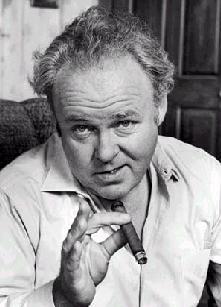Did Archie Bunker Teach Us Anything?

My son Jonathan told me he’d been trying to explain the basic argument of my book to a woman friend. He had said to her, “Mom’s showing how television and other entertainment can change society for the better. Say, the way Archie Bunker did.” And, he told me with satisfaction, “She got the point immediately.”
To his surprise, I cringed. All in the Family is not the kind of show I’d recommend as a way of influencing public opinion. Admittedly, I never watched many episodes of it because I disliked it. Still, I need to explain why it’s a bad approach to promoting cultural change, though it’s generally believed that it taught us to be more tolerant.
I’m not so sure it did. All in the Family featured Archie Bunker, an uncouth bigot who spouted racism and reactionary social views. Viewers were expected to laugh at him — not with him — for his troglodyte mentality. But as I recall, surveys at the time showed that the show often had the opposite effect. As anti-heroes go, Archie was almost lovable, so certain viewers identified with him and clapped whenever he confirmed their own prejudices. Even if this was rare, I think we need stories that influence public opinion without presenting negative role models for audiences to mock.
I don’t find stereotypes funny — even those such as All in the Family that ridicule my political adversaries, since they are exactly the people that I want to influence. No one is persuaded to change his mind when we exclude the Bunkers of this world from the moral community called “we” — the group with whom you and I identify. We need to bring such people back in as members of “us.” To reintegrate them depends on our empathy for them and the rational discussion of our opposing beliefs.
Mirthful laughter benefits a viewer’s health. But there’s laughter — and then there’s laughter. It’s sometimes possible to laugh, even at anti-heroes, without contempt. After all, anti-heroes are not necessarily villains — merely limited characters without “heroic” qualities. Sometimes we even identify with them. Take Mr. Bean, Rodney Dangerfield, or Charlie Chaplin, for example. Like Bunker, they are anti-heroes, except that, even as we laugh at their inadequacies, we feel affection for them.
But anti-heroes — even charming ones — are poor salesman for social doctrines. For example, The Great Dictator was filmed during World War II. In it Chaplin played the least heroic character on record: Hitler. We might suppose that this monstrous role was utterly antithetical to comedy. Yet Chaplin played him as a charming, light-hearted simpleton. In no way does this likeable anti-hero influence our political opinions, though we smilingly empathize with him. Had Chaplin played his Hitler in a realistic rather than a clownish way, empathy would have been impossible.
The bigot Archie Bunker was too realistic to be funny and if we had empathized with him, that would have brought us down to his moral level. When watching such realistic anti-heroes as Bunker, I cannot laugh, but some people do. Their laughter is derisive and contemptuous. Worse yet, such shows antagonize the real bigots of the world, who realize that they are being mocked. What we need to do is to enlighten sensibilities throughout our culture — especially among people of limited insight.
This is possible through brilliant entertainment. The shows that have the best effects always involve characters whom audiences come to love and respect — fictive characters who make discoveries that we too can absorb through our empathy for them.



2 Comments:
This is very informative. I hope to see more in the near future
I'm a random nobody that came across this blog post by accident really. I am no former professor or anything of that ilk. While I agree with some of the things you say, you said early on that you watched very few episodes of the series. By disavowing your knowledge of the show, your argument for the manner in which it works seems to lose some of its strength. Clearly, your opinion is one born of much thought and research but I can't help but feel that you have missed the mark on this show. Whether or not, we should look at an antihero as limited, is a completely another issue. This program started conversations about racism, women's issues, religious conflict, sexuality, aging, the working class, marriage and generation gap in a manner that had never been done before. To look back and say a different vehicle should have been used makes no sense. Television viewers of the time were not ready for a different vehicle. The character had to be lovable. To present these issues with a hardened political cynic, the show would never have made it. I don't think the show ever touted itself as a source of education on any issues, but it certainly put things on the American "TV Table" to be examined. Anyway, I'm not looking to start a debate, just felt like commenting. I didn't notice how old this entry was, apologies if it was written some time in antiquity.
Post a Comment
<< Home